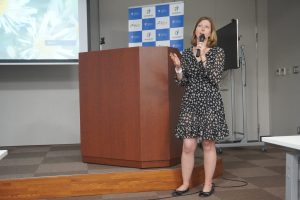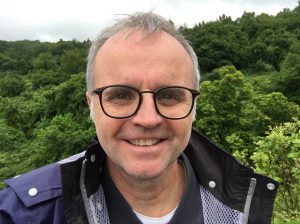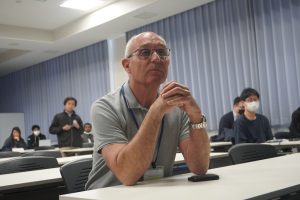April 17, 2023, we held an IER special seminar <Dr. Béatrice GAGNAIRE and Dr. Jean-Marc BONZOM>
| Date & Time | Mon. April 17, 2023, 15:00-16:30 JST |
| Venue | 6F Conference room, Main Bldg. IER/Online (Zoom) |
| Speakers | Dr. Béatrice GAGNAIRE, Senior researcher at IRSN, and Dr. Jean-Marc BONZOM, Senior researcher at IRSN |
| Title | Ongoing projects in radioecology between France (IRSN, INRAE, CNRS) and Japan (IER, Fukushima University): BEERAD, BEECONECT and RINSHO |
Dr. GAGNAIRE and Dr. BONZOM, Senior Researchers at IRSN, delivered presentations on the ongoing radioecology projects, namely BEERAD, BEECONECT and RINSHO, which involve collaboration between France (IRSN, INRAE and CNRS) and Japan (IER, Fukushima University). The seminar was attended by 31 researchers and students, including 12 online audiences.

Dr. GAGNAIRE leads the BEERAD collaborative project to study the effects of ionizing radiation, such as γ-rays, on honeybees by obtaining data from both laboratory and field experiments.
In 2022, a laboratory experiment was conducted to examine the potential effects of ionizing radiation on honeybee infection with Nosema ceranae, a well-known bee pathogen, under controlled conditions. The results revealed that bees subjected to both stresses, irradiation and infection, had higher mortality to the control group. In the field, at six sites selected in areas with different radiation dose rates (two sites in each area with near background radiation dose rate (0.15-0.30 μSv/h), low dose rate (4-8 μSv/h), and high dose rate (18-30 μSv/h)), six beehives were installed at each site, with four dosimeters for each in April 2023. Half of the hives are equipped with measurement devices of weight, temperature, and humidity as well as bee counters to monitor the activity of the population in the hives in real-time. During next visits planned in July and October 2023, bee samples will be collected to assess the effects of ionizing radiation on the honeybees on several parameters. Honey will be collected on a regular basis to measure radioactive contamination. Field experiments will continue in 2024, and at the end of the experiments, several parameters will be evaluated, including the viability of spermatozoid stored in the spermatheca of the queen. Pollinating insects including honeybees play a crucial role in maintaining plant biodiversity. The BEERAD project may allow us to predict more comprehensive effects of ionizing radiation on pollinating insects and on pollination.

Dr. Jean-Marc BONZOM presented about BEECONECT and RINSHO projects.
In the BEECONECT project, researchers are studying the effects of radioactive contamination on the cognitive abilities (learning and memory) of honeybees and other pollinating insects. It is known that bees and many other pollinating insects learn the color and fragrance of flowers when foraging and use this information in their subsequent foraging activities. These abilities can be inhibited by several environmental stressors (e.g., insecticides, heavy metals). Dr. Bonzom works with a research team of the French National Centre for Scientific Research (CNRS), directed by Dr. Mathieu LIHOREAU in order to develop a device that automatically measures the cognitive ability of honeybees and other pollinating insects. In the first step, he plans to install these automatic measuring devices in each of background, low dose rate, and high dose rate sites selected by BEERAD members. In the second step, he also plans to measure the cognitive health of many other pollinating insects with these automatic devices in other radiation-contaminated sites in Fukushima Prefecture. The RINSHO project aims to study the effects of radioactive contamination on soil biodiversity (procaryotes and eukaryotes) and two associated functional processes (degradation of organic matter and soil bioturbation) in forests in Fukushima Prefecture. Organic matter degradation and recycling thereafter are essential for maintaining soil fertility and biodiversity. Macrofaunas (earthworms, ants, and some soil beetles) are major contributors to bioturbation. The holes dug by earthworms facilitate the infiltration of water and air into the soil and enrich the diversity of microorganisms. The RINSHO project will focus on the effects of radioactive contamination on soil biodiversity, organic matter decomposition, and soil bioturbation.

